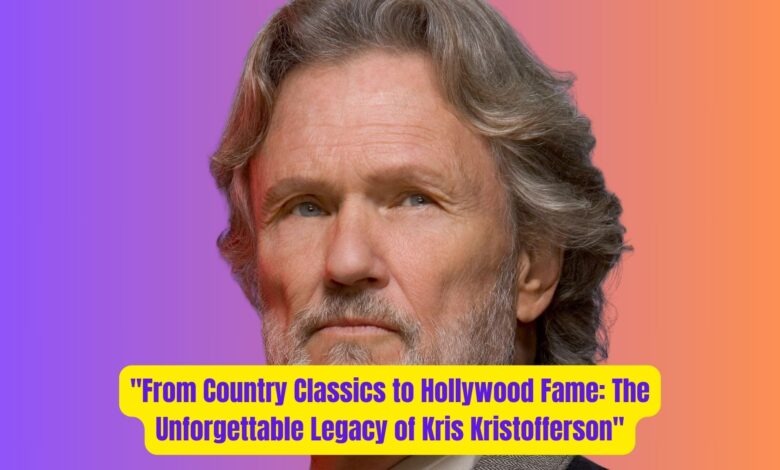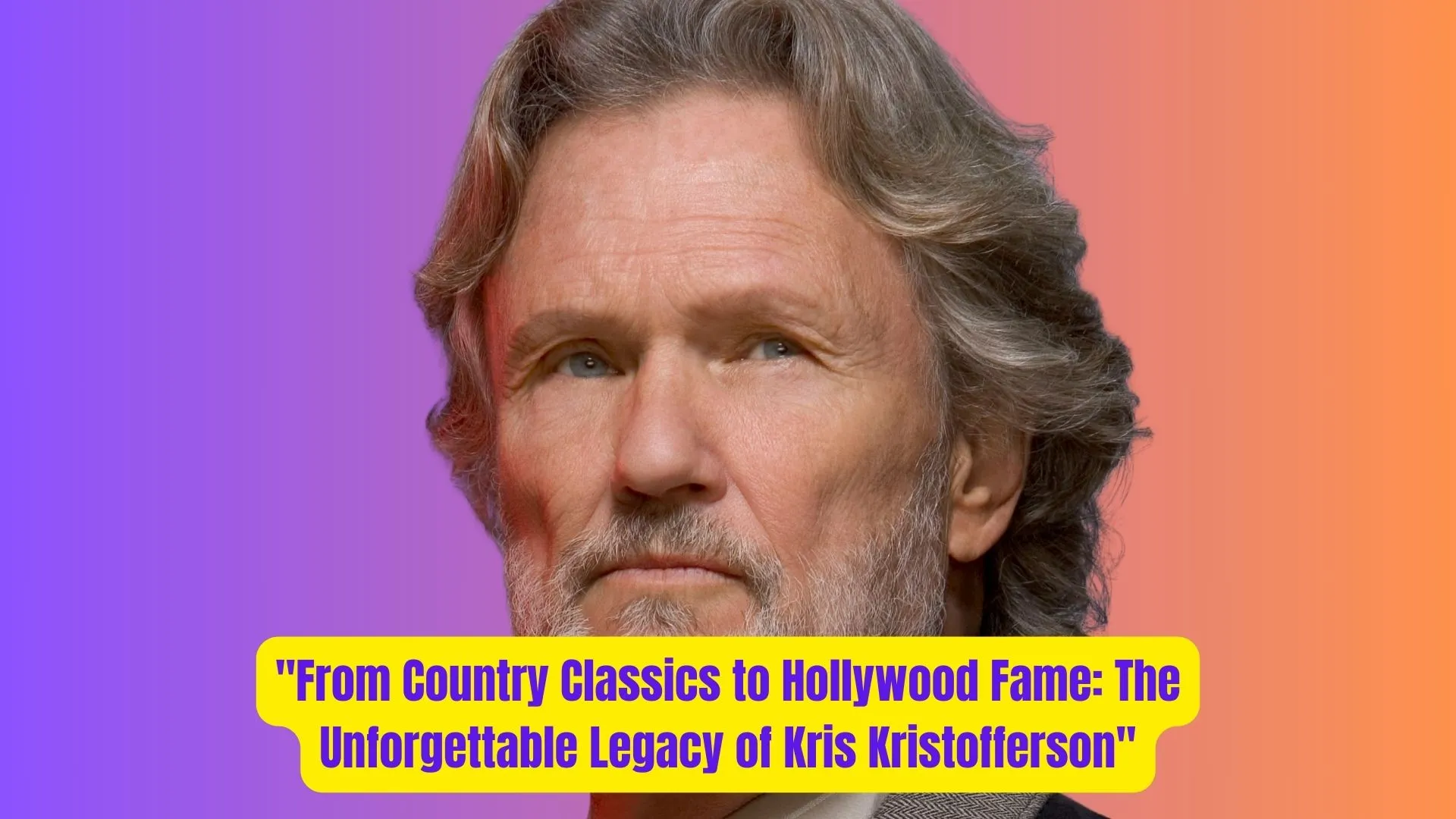“From Country Classics to Hollywood Fame: The Unforgettable Legacy of Kris Kristofferson”


Kris Kristofferson, a true icon in American country music and film, passed away at the age of 88. On September 28, surrounded by his family, Kristofferson took his final breath at his home in Maui, Hawaii. His family expressed their gratitude and shared their sorrow through a heartfelt statement, saying, “Thank you for loving him all these many years, and when you see a rainbow, know he’s smiling down at us all.”
Early Life and Military Background
Born on June 22, 1936, in Brownsville, Texas, Kristofferson was the son of Mary Ann (née Ashbrook) and Lars Henry Kristofferson, a Swedish immigrant and a U.S. Army Air Corps officer. Raised in a disciplined environment, Kristofferson moved often as a child, due to his father’s military career. His early exposure to various cultures and regions would later influence his songwriting and worldview.
His early love for country music began at a young age, when he wrote his first song, “I Hate Your Ugly Face,” at just 11 years old. Despite this passion for music, Kris initially followed a different path. After high school, he attended Pomona College, where he excelled in sports, academics, and even earned a Rhodes Scholarship to study at Oxford University. However, despite his academic success, his heart remained tethered to music.
Military Career and Transition to Music
Kristofferson served as a captain and helicopter pilot in the U.S. Army, a career that was aligned with his family’s expectations. However, his passion for music never left him. By the mid-1960s, after leaving the army, he decided to pursue his musical dreams full-time. This decision came at a considerable cost—his family disapproved, and Kristofferson struggled for years as he worked menial jobs to make ends meet, including janitorial work at Columbia Studios in Nashville.
It was during these difficult years that Kristofferson honed his craft as a songwriter. His songs, often filled with raw emotion, resonated deeply with many, and soon caught the attention of country music greats like Johnny Cash and Roger Miller.
Breakthrough as a Songwriter and Artist
Kris Kristofferson’s breakthrough came in 1970 when he released his self-titled debut album, which included some of his most iconic songs like “Me and Bobby McGee,” “Sunday Mornin’ Comin’ Down,” and “Help Me Make It Through the Night.” These tracks would go on to become timeless classics, covered by various artists across generations.
His ability to write songs that captured the human condition, marked by both vulnerability and resilience, set him apart from other songwriters of the era. “Me and Bobby McGee,” co-written with Fred Foster, became one of his most successful compositions. The song was made famous by Janis Joplin, whose version topped the charts in 1971.
Kristofferson’s lyrical style was introspective and often autobiographical, earning him a place among the greatest storytellers in music history. He was awarded a Grammy Award for Best Country Song for “Help Me Make It Through the Night” in 1971.
Transition to Acting and Hollywood Success
While Kristofferson’s legacy in country music was cemented, his talents extended far beyond songwriting. He became an accomplished actor, starring in several major films throughout the 1970s and 1980s. One of his most notable roles came in the 1976 film “A Star is Born”, where he starred opposite Barbra Streisand. For his portrayal of the troubled rock star John Norman Howard, Kristofferson won a Golden Globe Award for Best Actor in a Motion Picture Musical or Comedy**.
Throughout his acting career, Kristofferson worked with many of Hollywood’s biggest names and appeared in films such as “Pat Garrett & Billy the Kid” (1973), “Convoy” (1978), and “Blade” (1998), demonstrating his versatility as an actor. Despite his success in Hollywood, Kristofferson remained devoted to his music, continuing to release albums and perform well into his 70s.
Personal Life and Influence on Country Music
Kris Kristofferson’s personal life was as dynamic as his professional career. He was married three times and had eight children. His songwriting often drew from his personal experiences, including his struggles with relationships, addiction, and the pressures of fame. His authenticity and vulnerability made him relatable to fans and musicians alike.
Beyond his own music, Kristofferson had a profound impact on the country music landscape. He was part of the “Outlaw Country” movement, alongside artists like Willie Nelson and Waylon Jennings, which rejected the polished, commercial sound of Nashville in favor of a grittier, more authentic style. His work has been cited as an influence by artists across genres, from country to rock and folk.
Awards and Legacy
Over his career, Kristofferson earned numerous accolades, including induction into the Country Music Hall of Fame in 2004. In addition to his Grammy Awards, he received a Lifetime Achievement Award in 2014, solidifying his place as one of the most influential figures in country music.
Kristofferson’s legacy extends far beyond the music charts. His contributions to both music and film have made him a cultural icon whose work continues to resonate with audiences of all ages. His songs, full of poignant reflections on life, love, and loss, remain as relevant today as they were when first written.
Kris Kristofferson’s Final Years
In his later years, Kristofferson faced health challenges, including being misdiagnosed with Alzheimer’s disease, which was later revealed to be Lyme disease. Despite these obstacles, he continued to perform and record music, showing the same determination and passion that had defined his career.
Kristofferson’s passing marks the end of an era, but his music and films will ensure his legacy endures. As fans remember him, they will forever cherish his ability to tell stories through his songs, and his contributions to the world of entertainment will not be forgotten.
Kris Kristofferson leaves behind a rich legacy in both music and film. His unique voice, both as a songwriter and actor, set him apart from his contemporaries and ensured that his influence will continue to be felt for generations. As we reflect on his life, it’s clear that Kris Kristofferson was much more than just a country singer or an actor—he was a storyteller, a pioneer, and a legend.
